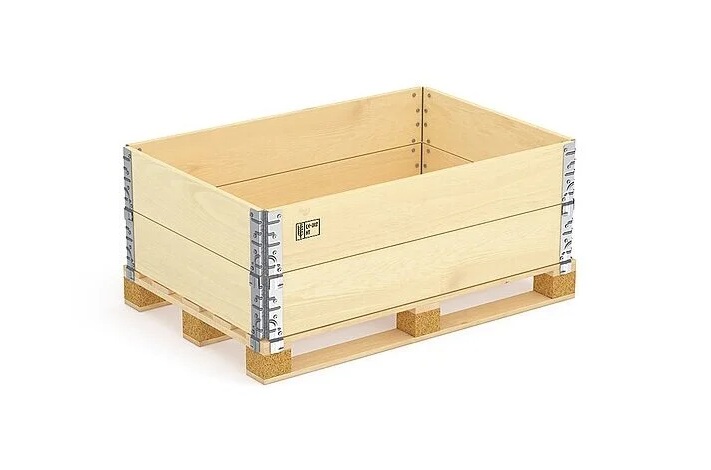In today’s fast-paced and highly competitive business environment, the efficiency of your supply chain can make or break your success. A critical component of this supply chain is the pallet, the flat transport structure that supports goods in a stable manner while being lifted by a forklift, pallet jack, or other jacking device. In India, wooden pallets are a popular choice due to their durability, cost-effectiveness, and ease of recycling. However, selecting the right wooden pallet manufacturer in India requires careful consideration of several factors to ensure that you receive high-quality products that meet your specific needs.
Understanding Your Requirements
Before diving into the selection process, it is essential to understand your specific requirements. Consider the following:
- Load Capacity: Determine the maximum weight the pallet needs to support.
- Dimensions: Specify the size of the pallet required for your products.
- Usage Environment: Consider if the pallets will be used in a humid environment, exposed to chemicals, or require special treatments.
- Regulatory Compliance: Ensure the pallets comply with local and international regulations, especially if you are exporting goods.
Research and Shortlisting
Start by conducting thorough research on wooden pallet manufacturers in India. Use online resources, industry directories, and recommendations from business associates. Shortlist manufacturers based on their experience, reputation, and product offerings.
Key Factors to Consider
When evaluating potential manufacturers for wooden pallet collars, consider the following key factors:
1. Quality of Materials
The quality of the wood used in pallet manufacturing is paramount. Indian manufacturers typically use a variety of woods, including hardwoods like teak and sheesham, and softwoods like pine and mango wood. Ensure the manufacturer sources wood from sustainable and legal sources. High-quality wood not only enhances the durability and strength of the pallets but also ensures compliance with international phytosanitary standards.
2. Manufacturing Process
The manufacturing process greatly influences the quality of the final product. Look for manufacturers who employ modern, automated machinery for precision cutting and assembly. Additionally, inquire about their quality control measures. Reputable manufacturers will have stringent quality checks at every stage of production to ensure consistency and reliability.
3. Customization Options
Every business has unique requirements. A good manufacturer should offer customization options in terms of size, design, and load capacity. Custom pallets can be designed to fit your products perfectly, thereby maximizing space and ensuring better protection during transit. Discuss your specific needs with the manufacturer and assess their capability to deliver customized solutions.
4. Compliance with Standards
Ensure the manufacturer complies with national and international standards. For instance, the International Plant Protection Convention (IPPC) standards are crucial for exporters. The ISPM 15 certification indicates that the wooden pallets have been treated to prevent the spread of pests and diseases. Compliance with such standards is not only a legal requirement for international shipping but also a mark of quality and reliability.
5. Sustainability Practices
In today’s environmentally conscious world, sustainability is a significant consideration. Choose a manufacturer committed to sustainable practices, such as using eco-friendly treatments and adhering to responsible sourcing of wood. Some manufacturers also offer pallets made from recycled wood, which can be a more sustainable option.
6. Lead Time and Delivery
Timely delivery is critical to maintaining an efficient supply chain. Discuss lead times and delivery schedules with the manufacturer. Ensure they have a robust logistics network to meet your deadlines. Additionally, consider manufacturers with multiple production facilities or those located close to your operations to minimize transportation time and costs.
7. Cost and Payment Terms
While cost should not be the sole deciding factor, it is undoubtedly an important consideration. Obtain detailed quotations from multiple manufacturers and compare them. Look for transparency in pricing, with no hidden charges. Discuss payment terms and conditions, and consider negotiating for better rates, especially for bulk orders.
8. Customer Support and After-Sales Service
Reliable customer support is vital for a smooth purchasing experience. Evaluate the manufacturer’s customer service responsiveness and willingness to address your concerns. Additionally, inquire about after-sales services, such as pallet repair and maintenance programs, which can extend the lifespan of your pallets and offer better value for money.
Visiting the Manufacturer
If possible, visit the manufacturing facility to get a firsthand look at their operations. This visit can provide valuable insights into their production capabilities, quality control processes, and overall working conditions. It also offers an opportunity to meet the team and discuss your requirements in detail.
Seeking References and Reviews
Ask the manufacturer for references from their existing clients. Contact these references to gain insights into their experiences with the manufacturer. Additionally, look for online reviews and testimonials. Positive feedback from other businesses can be a strong indicator of the manufacturer’s reliability and product quality.
Making the Decision
After thorough evaluation and comparison, make an informed decision based on the factors discussed. Choose a manufacturer that not only meets your quality and customization requirements but also aligns with your values, such as sustainability and ethical practices.
Building a Long-Term Relationship
Once you have selected a manufacturer, focus on building a long-term relationship. Establish clear communication channels, provide regular feedback, and collaborate on continuous improvement initiatives. A strong partnership with your pallet manufacturer can lead to better product innovation, improved supply chain efficiency, and mutual growth.
Conclusion
Selecting the right wooden pallet manufacturer in India is a critical decision that can significantly impact your business operations. By understanding your specific needs, conducting thorough research, and evaluating potential manufacturers based on key factors such as quality, compliance, and customer support, you can make an informed choice that ensures the efficiency and reliability of your supply chain. Investing time and effort into choosing the right manufacturer will pay off in the form of high-quality pallets, timely deliveries, and a sustainable partnership that supports your business goals.
